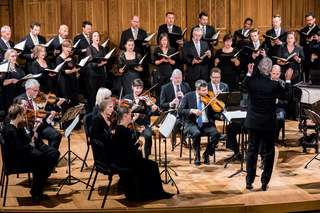|
Back
A 35th anniversary celebration Toronto
Trinity-St Paul’s Centre, Jeanne Lamon Hall
11/02/2016 - & November 3, 4, 5, 6, 2016
George Frideric Handel: Laudate pueri
Agostino Steffani: Stabat Mater, excerpted
Jean-Baptiste Lully: Amadis: Chaconne "Chantons tous"
Jean-Philippe Rameau: In convertendo Dominus
Jan Dismas Zelenka: Missa dei Filii: Gloria
Sherezade Panthaki (soprano), Philippe Gagné (tenor), Jonathan Woody, bass-baritone
Tafelmusik Orchestra and Chamber Choir, Ivars Taurins (director) 
(© Trevor Haldenby
The Tafelmusik Chamber Choir was formed in 1981, two years after the Tafelmusik Baroque Orchestra was established. Ivars Taurins, who was then in his twenties, has been the director ever since. This celebratory set of concerts is a marvelous display of the refined polish and expressiveness that has been achieved over the 35 years.
Three guest soloists added lustre: soprano Sherezade Panthaki and bass-baritone Jonathan Woody making welcome returns, and debuting tenor Philippe Gagné.
The opening, work Handel’s Laudate pueri, composed in Rome under the aegis of a cardinal of the Colonna dynasty, turned out to be a showcase for both the soprano and the chorus. The program notes describe the work as both virtuosic and lavish, which it proves to be. The joyous work overflows with an abundance of musical ideas, a harbinger of what the 22-year-old composer would subsequently produce.
Profound solemnity is the chief characteristic of the following work, Agostino Steffani’s Stabat Mater, composed for Hanover in 1724. In the opening verses three soloists from the 22-member choir assumed solo parts: Michelle DeBoer, soprano, Richard Whittall, alto, and Cory Knight, baritone. The choir performs the final verses which become halting to the point of losing articulation - until the final line when the reference to paradise animates the music.
The orchestra gave its customary fine support in the first two works but really came into its own in the Chaconne from Lully’s Amadis of 1684. In this case the chaconne is not just a dance, but the happy finale to the opera in which a pair of lovers celebrate their triumph over a host of fantastical vicissitudes. If any music defines Arcadian stateliness, this is it, with the woodwinds adding pure magic to the glowing introduction. Ms. Panthaki and Mr. Woody are the two lovers, while Mr. Gagné sings the role of a Hero. All three - Mr. Gagné especially - offer urgently communicative operatic delivery of the text with vibrato-free baroque vocal technique.
Another French work followed, Rameau’s In convetendo Dominus, a treatment of Psalm 126. Here is another joyful work - also grand and rich, presented in Paris when Rameau was at the peak of his operatic career. More wonderful music for the woodwinds.
Zelenka’s Gloria from the incomplete Missa dei Filii has four members of the chorus in brief solos, but the intricate choral music, accompanied by the pulsing orchestra, is the distinguishing feature. The conclusion was like 22 thoroughbred racers crossing the finish line all at once. Truly a breathtaking end to a well-earned festivity.
Michael Johnson
|